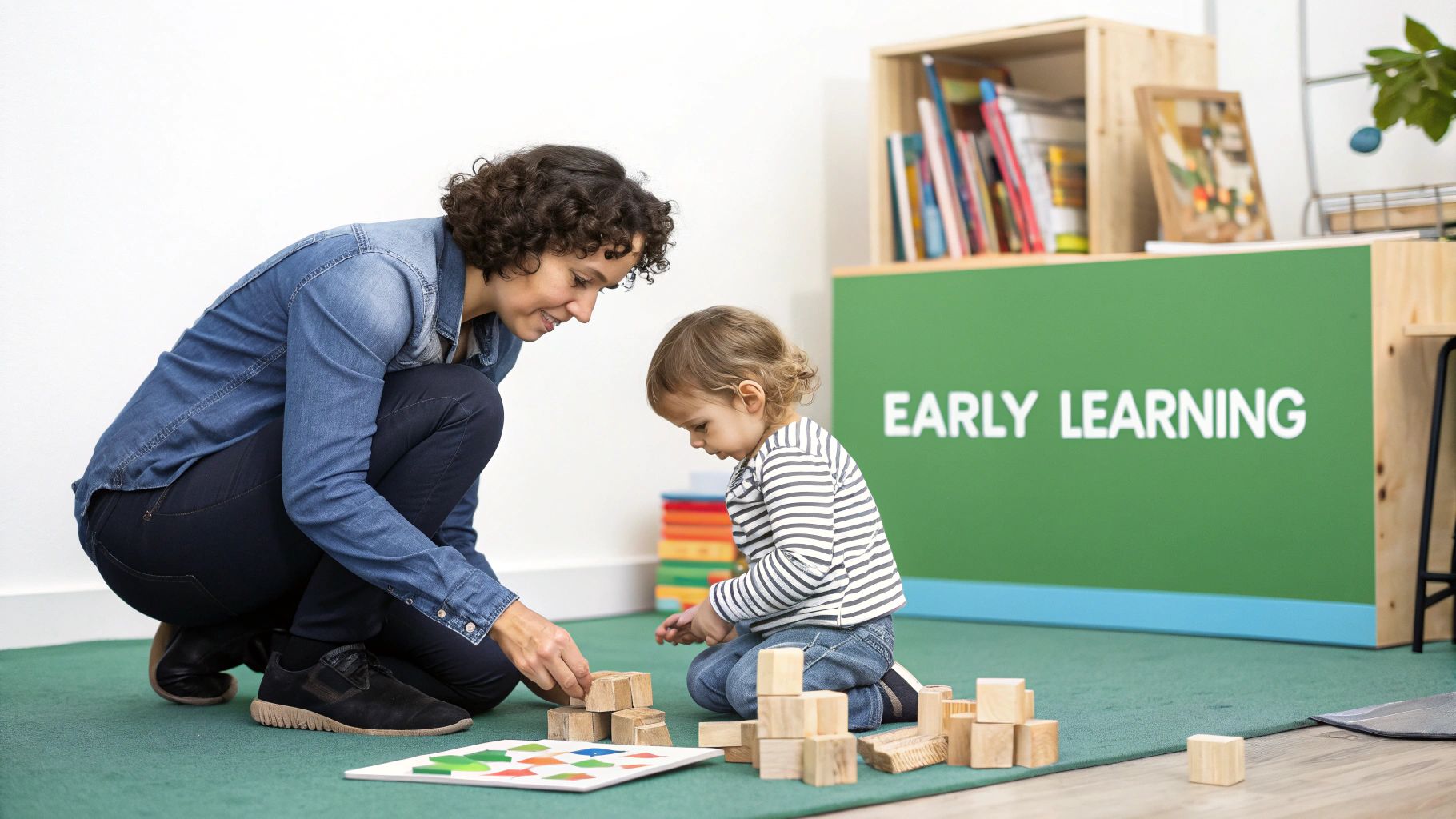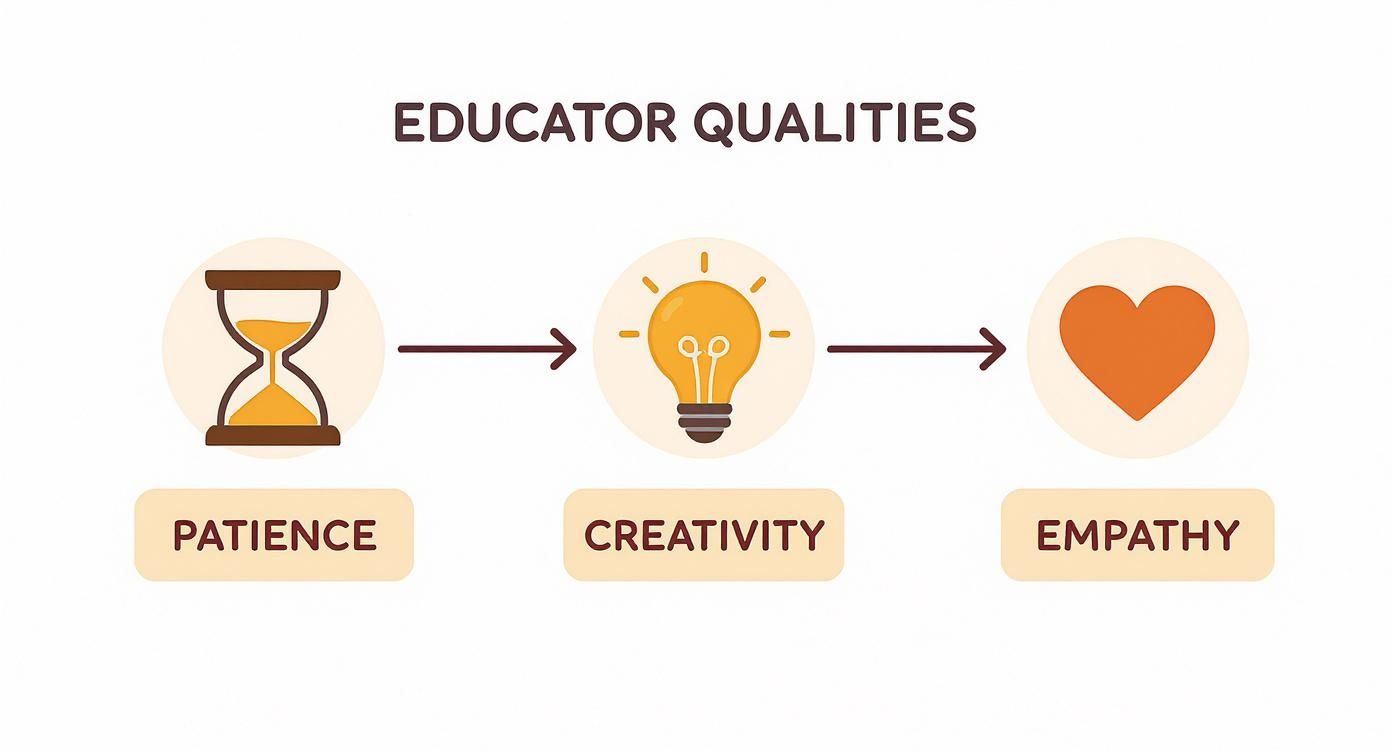
Do you have a passion for helping young children learn and grow? An early years educator is a skilled professional who shapes the learning experiences that form the foundation of a child's life. More than a caregiver, you are the architect of their emotional, social, and educational development from birth to age five.
But what's one of the most crucial skills you'll need? It’s not just about finger painting or story time—it's about building strong partnerships with everyone involved in a child's world. Let's explore why teamwork is so vital and how the right qualification can make you an expert in it.
The power of partnership working for an early years educator

Imagine a child’s support system as a team. On that team, you have parents, carers, colleagues, and other professionals. When everyone communicates and works together, the child feels secure, understood, and ready to thrive. This is the essence of partnership working. It's a core skill for any early years educator and has a direct impact on a child’s happiness and development.
This collaborative approach ensures every child gets consistent support, whether at home or in the nursery. When you get this right, you create a seamless and nurturing environment where children can truly flourish.
Why strong partnerships matter
For an early years educator, building relationships is just as important as planning activities. It involves creating a network of trust and open communication with several key groups.
Key partnerships include:
-
Parents and Carers: They are the child's first and most important teachers. By working closely with them, you can share insights, celebrate milestones, and ensure learning continues at home. This makes them feel valued and involved in their child's education.
-
Colleagues: Your team members are your daily support system. Effective teamwork means sharing observations, planning together, and creating a consistent, positive atmosphere for the children in your care.
-
Other Professionals: You will often collaborate with specialists like health visitors, speech therapists, and social workers. Strong professional relationships ensure children get the targeted support they need, right when they need it.
-
Regulatory Bodies: Working confidently with organisations like Ofsted demonstrates your commitment to high standards and helps maintain a safe, high-quality learning environment for every child.
An exceptional early years educator acts as a central hub, connecting the child's family, the educational setting, and wider support services. This teamwork ensures every child gets the holistic support they need to succeed.
How to master partnership working with the right qualification

Developing these crucial partnership skills doesn't happen by chance—it requires dedicated training. The TQUK Level 3 Diploma for Working in the Early Years Sector (Early Years Educator) offered by Stonebridge is designed to build your expertise in this vital area.
This industry-recognised qualification doesn't just teach you the theory of child development; it gives you the practical tools to build the strong, collaborative relationships that define an outstanding educator.
A dedicated module for partnership working
At Stonebridge, we understand how critical this skill is. That’s why our diploma includes Module 10: Partnership Working. This entire unit is focused on equipping you with the confidence and competence to collaborate effectively.
Upon completing this module, you will understand how to:
-
Build and sustain relationships with parents, carers, colleagues, and other agencies.
-
Encourage parents to take an active role in their child's learning journey.
-
Work co-operatively with other professionals to meet the individual needs of babies and children.
-
Communicate effectively to ensure every child can progress and thrive.
-
Work confidently with Ofsted, using its framework to deliver outstanding care and education.
This module ensures that when you qualify, you're not just ready to plan a lesson—you're ready to be a key player in a child's support network from day one.
The Qualities of an Exceptional Educator
While qualifications give you the essential knowledge to start, what truly makes an Early Years Educator exceptional are the personal qualities they bring into the room each day. Think of it this way: your diploma is like the map, but your personal attributes are the compass that guides you through the unpredictable and wonderful journey of helping young minds flourish.
These traits aren't just ‘nice-to-haves’; they are the very tools you'll rely on to connect with children, build trust with their families, and create a truly magical learning environment. Technical skills can always be taught, but the most impactful educators have an innate blend of patience, creativity, and empathy.
Core Competencies for an Early Years Educator
| Competency | Why It's Important | Example in a Nursery Setting |
|---|---|---|
| Patience | Children develop at different speeds. Patience creates a low-stress environment where they feel safe to try, fail, and try again without fear. | Gently guiding a child through the steps of putting on their coat, even if it takes several minutes and multiple attempts. |
| Creativity | Keeps learning exciting and engaging. A creative approach turns mundane activities into memorable, playful experiences that capture a child's imagination. | Using recycled materials like boxes and tubes to build a fantasy castle instead of just using standard building blocks. |
| Empathy | Helps you connect with children on an emotional level. It allows you to understand their unspoken needs, fears, and joys, building deep trust. | Noticing a child is sitting alone and quietly joining them, acknowledging they might be feeling sad and offering a hug or a favourite toy. |
| Communication | Essential for interacting with children, parents, and colleagues. Clear, simple language helps children understand, while professional communication builds confidence with families. | Explaining to a parent at pick-up time not just what their child did, but how they felt—"Leo was so proud when he finished his painting today!" |
| Organisation | A well-organised environment is predictable and calming for young children. It's also crucial for planning activities, managing resources, and ensuring safety. | Having designated, clearly labelled areas for different activities (e.g., a quiet reading corner, a messy play station) so children know what to expect. |
| Resilience | The early years sector can be demanding. Resilience helps you navigate challenging days, manage stress, and maintain a positive attitude for the children. | After a particularly chaotic morning, taking a few deep breaths during nap time to reset before the afternoon activities begin. |
These competencies show that being a great educator is a blend of heart and skill. Your natural empathy and creativity are powerful assets, and formal training helps you channel them into effective, structured teaching strategies.
To see how these personal attributes align with professional development, you can learn more about what skills you need to become an early years practitioner in our detailed guide. A great course won’t just teach you the theory; it will show you how to apply your innate talents to develop crucial professional skills in observation, communication, and teamwork.
Your pathway to becoming a qualified educator

Deciding to become an early years educator is a fantastic choice, and thankfully, the route to getting qualified is more straightforward than you might imagine. Think of this as your roadmap, guiding you through the steps to gain the skills, knowledge, and official credentials you need to walk into this rewarding career with confidence.
At the very heart of this journey is the industry gold standard qualification: the TQUK Level 3 Diploma for Working in the Early Years Sector (Early Years Educator). This is the key that unlocks the official ‘Early Years Educator’ title, proving you’ve met the high standards required to help children learn, develop, and thrive.
Choosing your learning style
For years, the only option was to enrol at a physical college, sticking to a fixed and often inconvenient timetable. While that route works for some, it’s a real hurdle for adults juggling jobs, family, and everything else life throws at them.
This is where flexible online learning has completely changed the game. An online diploma gives you the exact same respected qualification but puts you in control. You study when and where it suits you, fitting your learning around your life, not the other way around. It’s a modern approach that makes changing careers or levelling up your skills a realistic goal for everyone.
An online diploma isn't a lesser option; it’s a smarter one for self-motivated individuals. It provides the same robust curriculum and expert support as a traditional course but with the flexibility that modern life demands.
The importance of hands-on experience
Learning the theory is one thing, but early years education is all about putting it into practice. That’s why a mandatory work placement is a non-negotiable part of any reputable Level 3 Diploma. This is your chance to apply everything you’ve learned in a real early years setting, working directly with children under the watchful eye of seasoned professionals.
It’s this powerful blend of academic knowledge and practical, hands-on work that truly shapes you into an exceptional early years educator. Your placement is the bridge between knowing the theory and living the practice, ensuring you’re ready to make a positive difference from day one.
Launch your career with a flexible online diploma

Ready to turn your passion into a profession? With the TQUK Level 3 Diploma for Working in the Early Years Sector (Early Years Educator) from Stonebridge Associated Colleges, you can gain the industry-recognised qualification you need in a way that fits your life.
Why choose Stonebridge?
We believe education should be accessible to everyone. With over twenty years of experience, Stonebridge offers a modern learning experience designed for busy adults. Our flexible subscription model puts you in control.
Here’s what makes us different:
-
Study 100% Online: Learn at your own pace, whenever and wherever suits you. Fit your studies around your work and family commitments without the stress of rigid deadlines.
-
No Long-Term Debt: Forget complicated credit agreements. You pay a simple, affordable monthly fee.
-
Ultimate Flexibility: You can pause or cancel your subscription at any time. If life gets in the way, your education can wait for you.
-
Expert Support: You’re not alone on your journey. You’ll have a dedicated personal tutor to guide you, answer your questions, and provide expert feedback.
The Stonebridge model removes the barriers that stop people from achieving their dreams. We provide accredited, career-focused qualifications that are affordable, flexible, and designed for real life.
Are you ready to become a qualified early years educator and start making a real difference? Your new career is closer than you think.
Enrol in the TQUK Level 3 Diploma today and take the first step towards a rewarding future with Stonebridge.
Your Questions Answered
It’s completely natural to have a few questions buzzing around your head as you think about starting a new career. It’s a big decision! Let's tackle some of the most common ones to give you the clarity you need to move forward with confidence.
Getting these practical details straight is what turns a dream into a real, achievable plan. So, let's talk about salary, career options, and what it really takes to get qualified.
What salary can I expect as an early years educator?
Your salary will depend on your location, experience, and the type of setting you work in. A newly qualified early years educator can typically expect to start on £18,000 to £22,000 per year. With experience, this can rise to around £25,000, and leadership roles like Nursery Manager can command salaries of £35,000 or more.
What career paths are open to me?
Your Level 3 Diploma is a launchpad for a varied and rewarding career. You could progress to become a Room Leader, Deputy Manager, or even a Nursery Manager. Other exciting paths include specialising as a Special Educational Needs Coordinator (SENCO) or starting your own business as a registered Childminder.
Do I need a university degree?
No, you don't. The industry gold standard for becoming a qualified early years educator is the Level 3 Diploma. This vocational qualification is specifically designed to give you the practical, job-ready skills that employers are looking for, making it the most direct route into the profession.
How long does the course take?
The beauty of studying online with Stonebridge is that you set the pace. While most learners complete their diploma in 12 to 18 months, you can finish much faster if you have more time to dedicate. The flexibility is entirely yours.
Ready to start your journey and make a real difference in the lives of young children? With Stonebridge Associated Colleges, you can gain your industry-standard qualification flexibly and affordably.
Begin your TQUK Level 3 Diploma for Working in the Early Years Sector today.




